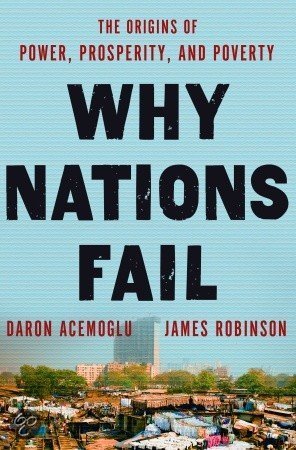Discvr
menu zoek
Why Nations Fail
We in the West are the "haves." Much of the rest of the world - Africa, South Asia, South America - are the "have-nots." While it has always been this way - a world divided by wealth and poverty, health and sickness, food and famine - the extent of inequality across nations today is unprecedented. Using an extraordinary range of contemporary and historical examples based on fifteen years of research, Why Nations Fail develops a provocative new theory of political economy explaining why the world is divided into nations with wildly differing levels of prosperity. -Nogales, Arizona and Nogales, Sonora in Mexico are separated by a fence. The background of the residents on both sides are similar and they have the same culture. Why do people north of the fence have an average income three times as much as those on the other side? Why are they better educated? Why are public amenities such as roads and law and order considered as givens north of the border, but much less so in the south? -Botswana gained its independence in 1966 with few miles of paved road, no infrastructure and few, if any, prospects for growth. But it has become one of the fastest growing countries in the world over the past 40 years , as well as sub-Saharan Africa's most stable democracy. What are the reasons? Why is there such a contrast between it and other countries such as Congo - one of the world's poorest and most war-ravaged societies - a nation that in the 15th century had a capital larger than London? -Why is North Korea, a geographical, ethnic and cultural mirror of its capitalist neighbor to the south, ten times poorer than South Korea? -Singapore, a once-impoverished tropical island, became the richest nation in Asia after property rights were enshrined and trade encouraged. Myanmar (Burma), on the other hand, is resource rich but one of the poorest countries in Southeast Asia, as its ruling generals have neither invested in infrastructure or education nor provided the incentives for private investment. Authors such as Jeffrey Sachs in The End of Poverty and Jared Diamond in Guns, Germs and Steel have offered useful insights into the reasons for certain aspects of poverty: geography and the weather; technology; the value of certain plants and animal species. What they ignore are incentives and institutions. People need incentives to invest and prosper; they need to know that if they work hard, they can make money and actually keep that money. And the key to ensuring these incentives is sound institutions - the rule of law and security and a governing system that offers opportunities to achieve and innovate. Incentives and institutions are what separate the have and have-nots. Blending economics, politics, history and current affairs, Daron Acemoglu and James Robinson provide a new, persuasive way of understanding wealth and poverty. And, perhaps most importantly, they provide a pragmatic basis for the hope that those mired in proverty can be placed on the path to prosperity.
